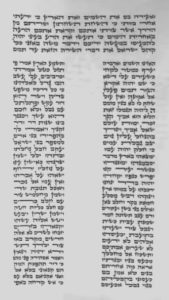Parashat Ha’azinu: The Mama and the Papa?
 This is the end, beautiful friends. We are in the final speech which Moses delivers. Parashat Ha’azinu (Deuteronomy 32:1-52) is, for all intents and purposes, our final Torah Portion before we begin again. Next week, our Torah portion is a special one for Chol HaMoed Sukkot (the middle days of the festival of Sukkot), and then we are back at Bereshit, the beginning of Genesis.
This is the end, beautiful friends. We are in the final speech which Moses delivers. Parashat Ha’azinu (Deuteronomy 32:1-52) is, for all intents and purposes, our final Torah Portion before we begin again. Next week, our Torah portion is a special one for Chol HaMoed Sukkot (the middle days of the festival of Sukkot), and then we are back at Bereshit, the beginning of Genesis.
Most of the portion is a Shirah, a song, which uses stunning examples of Biblical poetry. It is also a visually stunning portion – split into two narrow columns, rather than the one, justified column.
The imagery throughout the song is quite evocative. The text contains many different metaphors for both God and for the people of Israel. Most noteworthy? The images of God which are strikingly feminine.
And what was your reaction just now, reading that previous sentence? Intrigue? Apathy? Anger? How do you feel when gender is assigned to God, particularly the female gender?
Before you answer that God doesn’t have gender, focus on how often we default into calling God, “He, Him, Lord, etc.” So many of us picture God as a bearded man, sitting on high in judgment. What happens when we use language or imagery which is maternal, feminine, or even gender-neutral or transgender?
Deuteronomy 32:11 – a mother eagle bearing her young?
כְּנֶ֙שֶׁר֙ יָעִ֣יר קִנּ֔וֹ עַל־גּוֹזָלָ֖יו יְרַחֵ֑ף יִפְרֹ֤שׂ כְּנָפָיו֙ יִקָּחֵ֔הוּ יִשָּׂאֵ֖הוּ עַל־אֶבְרָתֽוֹ׃Like an eagle who rouses his nestlings, Gliding down to his young, So did He spread His wings and take him, Bear him along on His pinions;
Deuteronomy 32:13:
יַרְכִּבֵ֙הוּ֙ עַל־במותי [בָּ֣מֳתֵי] אָ֔רֶץ וַיֹּאכַ֖ל תְּנוּבֹ֣ת שָׂדָ֑י וַיֵּנִקֵ֤הֽוּ דְבַשׁ֙ מִסֶּ֔לַע וְשֶׁ֖מֶן מֵחַלְמִ֥ישׁ צֽוּר׃
He set him atop the highlands, To feast on the yield of the earth; He nursed him honey from the crag, And oil from the flinty rock,
And what about:
Deuteronomy 32:18:
צ֥וּר יְלָדְךָ֖ תֶּ֑שִׁי וַתִּשְׁכַּ֖ח אֵ֥ל מְחֹלְלֶֽךָ׃
You neglected the Rock that begot you, Forgot the God who labored to bring you forth.
Indeed, one of the translations of God’s name, El Shaddai, is “The Breasted God.” There is much debate about the correct translation of each name of God, and one of the suggestions for this early name of God is that God is the Breasted God.
Together, I hope to wrestle with you all as we ponder the gender of God. We will challenge our assumptions, and perhaps expand how and in which ways we consider the identity of God. I hope to have a healthy debate as we approach the new year of Torah Study later this month.
Shabbat Shalom!





